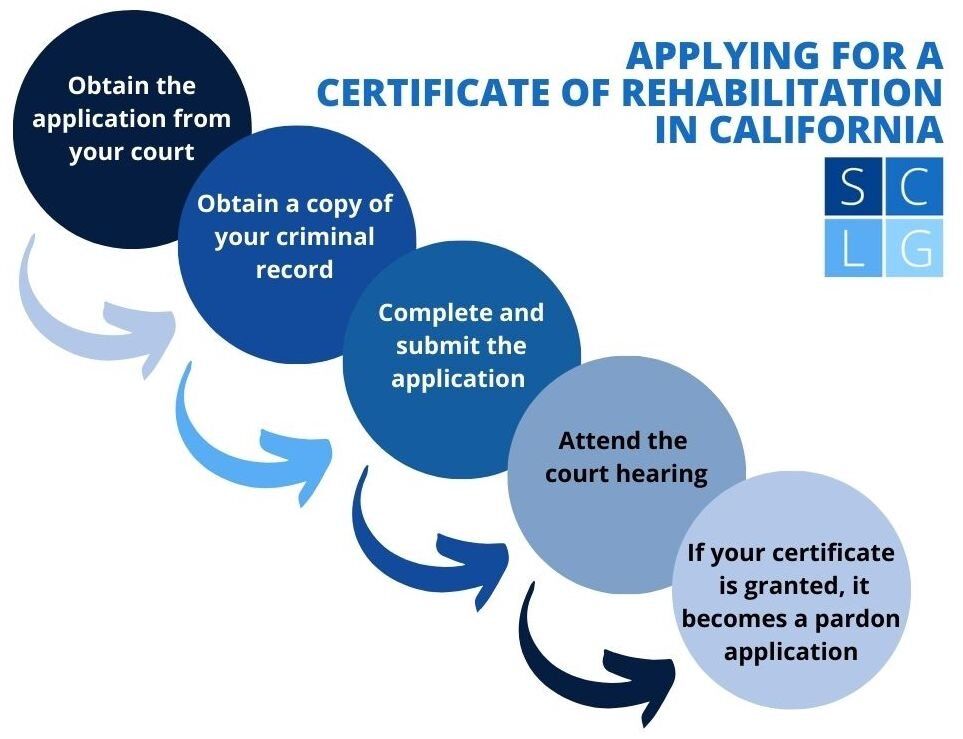You were convicted of any of the following sex crimes:
- Penal Code 286(c) – sodomy with a child or sodomy by force or threat,
- Penal Code 288 – lewd acts with a child under 14 (child molestation),
- Penal Code 287(c) – oral copulation with a child or oral copulation by force or threat,
- Penal Code 288.5 – continuous sexual abuse of a child, or
- Penal Code 289(j) – forcible sexual penetration of a child; 15 or
If you are ineligible for a COR due to a child sex crime, you may still be eligible to get a pardon from the California governor. 17
5. How long must I wait before applying?
As an applicant for a Certificate of Rehabilitation, you must be able to prove a “satisfactory period of rehabilitation.” A “satisfactory period of rehabilitation” is defined as:
- Residency of five continuous years in California immediately before applying, 18 PLUS
- An additional two to five years, depending on the crime of which you were convicted. 19
The rehabilitation period begins running on the date on which you:
- Complete parole or probation,
- Are released from community supervision, or
- Are released from mandatory supervision. 20
Note that the rehabilitation period is normally the MINIMUM period that must have passed for you to receive a certificate of rehabilitation. It is not a guarantee that your petition will be granted.
Also, no matter how much time has passed, you must have resided in California continuously for the five-year period immediately preceding the filing of the petition.

If you are convicted of sex crimes against children, you are not eligible for a California Certificate of Rehabilitation. You may be able to seek a governor’s pardon.
Crimes with a Nine-Year Waiting Period
Certain serious felonies (other than sex crimes) require at least a nine-year period before you can apply for a COR. This includes the five-year residency requirement plus a rehabilitation period of an additional four years.
Crimes which require a nine-year waiting period include:
- Penal Code 187 – murder,
- Penal Code 209 – aggravated kidnapping,
- Penal Code 219 – derailing or wrecking a train,
- Penal Code 4500 – assault with force likely to cause great bodily injury,
- Penal Code 12310 – use of explosives or destructive devices causing death, mayhem, or great bodily injury,
- Military and Veterans Code 1672(a) – acting or failing to act so as to cause another person’s death, or
- Any other offense that carries a life sentence. 21
Crimes with a Ten-Year Waiting Period
Certain sex crimes require at least a 10-year period before you can apply for a COR. This includes the five-year residency requirement plus a rehabilitation period of an additional five years.
Crimes which require a 10-year waiting period include all California sex crimes which mandate sex offender registration other than: 22
- Certain child pornography crimes under Penal Code 311.2,
- “Sexual exploitation of a child,” or
- Penal Code 314 – obscene conduct / indecent exposure. 23
(These last three offenses require a two-year additional period, as noted in Section 5, below).
Crimes with a Seven-Year Waiting Period
All other offenses require a seven-year rehabilitation period before you can apply for a Certificate of Rehabilitation. 24
This includes the five-year residency requirement plus a rehabilitation period of an additional two years.
Waiver of the Rehabilitation Period in Exceptional Cases
Judges can grant a certificate of rehabilitation before the applicable period of rehabilitation if it would serve the interests of justice. 25
This waiver of the period of rehabilitation is not permitted, however, if the offense requires you to register as a sex offender. 26
6. What is the application process?
If you meet the eligibility requirements, you may file for a Certificate of Rehabilitation at any time after the minimum rehabilitation period has passed. 27
Keep in mind you must have lived continuously in California for five years immediately before applying. 28
Obtaining and Filing a Petition for a COR
A petition for a certificate of rehabilitation can be obtained from the Superior Court in the county where you reside.
You can find your local court at the Judicial Branch of California’s “Find My Court” webpage.
Obtaining a Copy of Your Criminal Record
Along with a petition for a Certificate of Rehabilitation, you must submit the following information:
- The date of each conviction,
- The county in which the conviction occurred,
- The specific charge(s) you were convicted of,
- The sentence handed down, and
- The date of release from prison or jail (if applicable), and
- The date of discharge from probation or parole.
Regardless of your number of convictions, you need to file only a single petition.

You can obtain a copy of your criminal record from the court where you were convicted or from the California Department of Justice
Where can I get a copy of my criminal record?
You can get a copy of your criminal record either:
- From the court in which the conviction(s) took place, or
- Through the California Department of Justice.
Instructions for obtaining a criminal record for the DOJ are available at the California Office of the Attorney General website.
There is a $25 fee to obtain a criminal record from the DOJ.
How much does it cost to get a COR?
There is no filing fee and there are no court costs to get a certificate of rehabilitation in California. 29
If you are represented by your personal attorney, the cost will be at your expense (unless the lawyer is working pro bono). 30
Do I need to be represented by a lawyer?
If you are applying for a Certificate of Rehabilitation, you do not need to be represented by a lawyer.
Remember — the choice of whether to grant a Certificate of Rehabilitation is completely within the court’s discretion. So using a lawyer to help with your application is recommended.
What if I cannot afford a lawyer?
If you cannot afford an attorney, you have the right to be represented by public counsel or an adult probation officer. 31
You also have the right to receive counsel and assistance from all rehabilitative agencies. These include:
- The adult probation officer of the county,
- State parole officers, and,
- If you are under 30 years of age, the Department of Corrections and Rehabilitation, Division of Juvenile Facilities. 32
Will there be a hearing?
The court will usually schedule a hearing to help the judge decide whether to grant a Certificate of Rehabilitation. If the court elects to hold a hearing, it will give notice to:
- The governor’s office, and
- The district attorney of each county in which you were convicted. 33
These parties may or may not choose to contest the granting of a certificate.
You may be represented by a lawyer at this hearing.
What happens at the hearing?
At the hearing, you or your attorney will present evidence in favor of a Certificate of Rehabilitation. Most of the time, the judge will require that you personally attend the hearing.
Whenever possible, our criminal defense attorneys try to meet with the prosecutor before the hearing in an attempt to gather their support.
The support of the prosecuting agency can be a powerful factor in convincing the judge to issue a favorable decision.

An applicant will usually be granted a hearing to try to persuade the judge to grant a California Certificate of Rehabilitation
Factors the Judge Will Consider
The court may consider any relevant evidence when deciding whether to grant a Certificate of Rehabilitation. Evidence you will want to submit to the court often includes:
- Proof that you are employed or enrolled in school,
- Work and education history,
- Proof of volunteer work,
- Letters of character recommendation from friends, family, employers, co-workers, teachers, prison psychologists, and others,
- A statement of the reason you are seeking the COR,
- Proof of residence, and
- Anything else that would help to establish your good character, rehabilitation and eligibility.
The court will also look at:
- The trial record and/or record of court proceedings,
- Your criminal history (including the facts and severity of the crime), 34
- Your prison record,
- How long it has been since you completed probation or parole,
- Family and community ties, and
- Arguments (if any) presented by the D.A. 35
How long does it take to get a COR?
From start to finish, the process of obtaining a Certificate of Rehabilitation is usually about two to six months.
Typically, it takes about 120 days from filing the petition to the date of the hearing. It varies from county to county.
An experienced California criminal lawyer can help you determine how long it will take to process your applications.
7. What happens when the court grants a Certificate of Rehabilitation?
When the court grants a Certificate of Rehabilitation, it forwards a copy to:
- The California Governor’s office,
- The Board of Parole Hearings,
- The California Department of Justice, and,
- If you were twice (or more) convicted of a felony, to the California Supreme Court. 36
Note that the governor may not grant a pardon to you if you were convicted of two or more felonies unless a majority of the Supreme Court judges recommend it. 37
Automatic Application for a Governor’s Pardon
When a COR is granted, it automatically becomes an application for a California governor’s pardon. 38 No further action by you is needed.
A governor’s pardon can confer several additional benefits, including:
- Restoring California gun rights, 39 and
- If you are a non-citizen, preventing deportation.
The governor’s office may or may not choose to seek additional information from you or the Parole Board. 40 The Governor is not legally required to seek any such information or to grant a pardon. 41
What happens to my criminal record after a COR has been granted?
A Certificate of Rehabilitation does not expunge or erase your criminal record. Though once it has been granted, the Department of Justice will forward a copy to the Federal Bureau of Investigation (FBI). 42
Your criminal record will then reflect that a Certificate of Rehabilitation has been granted in connection with the specified offense(s).
8. What if the court denies the application?
If the court denies your petition for a Certificate of Rehabilitation, you can appeal.
Unlike filing a petition, there is a fee to file an appeal. Since granting a petition is within the court’s discretion, appeals usually fail.
So a better option is usually to wait and try again at a later date. 43
9. Can a COR keep me from being deported?
A California Certificate of Rehabilitation does not prevent a crime from being used to deport you if you are a non-citizen.
However, getting a COR is the first step to obtaining a governor’s pardon, which often does prevent deportation (unless the conviction is for a drug crime).
10. How else can I clear a criminal record in California?
Several options besides a Certificate of Rehabilitation and governor’s pardon are available to you if you have a criminal record.
Reduce a Felony to a Misdemeanor
You are eligible for this procedure if you were:
- Convicted of a “wobbler” crime as a felony, and
- Sentenced to and completed felony probation for the offense. 44
Expungement
Expungement (under Califronia Penal Code 1203.4 PC) offers certain benefits that a COR does not. These include:
- Protection against employment discrimination based on the expunged conviction, 45
- Making it easier to obtain a state professional license, and
- Preventing the expunged conviction from being used to impeach your credibility as a witness in court (unless you are the defendant in a subsequent case). 46
Seal and Destroy an Arrest Record
You may be eligible to get a California arrest record sealed and destroyed as a matter of right if:
- You who were arrested but never convicted, or
- Your conviction was vacated on appeal. 47
If you were adjudicated to be a juvenile delinquent, you are also eligible to get your juvenile record sealed and destroyed if:
- You are 18 or older OR five years have passed since the jurisdiction of the juvenile court terminated;
- You have not been convicted of a crime involving moral turpitude as an adult; and
- The original crime was not a particularly serious offense (such as murder, torture or robbery) committed after you turned 14. 48
Commutation of Sentence
If you are serving time, you may be eligible to get a sentence commuted by the California governor. A commutation does not restore lost civil rights but it can:
- reduce a sentence or
- make you immediately eligible for parole.
Additional Reading
For more in-depth information, refer to these scholarly articles:
- Redemption at a Correctional Turning Point: Public Support for Rehabilitation Ceremonies – Federal Probation.
- Criminal Records, Positive Credentials and Recidivism: Incorporating Evidence of Rehabilitation Into Criminal Background Check Employment Decisions – Crime & Delinquency.
- An Analysis of Certificates of Rehabilitation in the United States – Corrections.
- From Criminal Confinement to Social Confinement: Helping Ex-Offenders Obtain Public Housing with a Certificate or Rehabilitation – New England Journal on Criminal & Civil Confinement.
- Certificates of Rehabilitation and Other Forms of Relief from the Collateral Consequences of Conviction: A Survey of State Laws – ABA.
Legal References:
- California Penal Code 4852.16 PC: “The certified copy of a certificate of rehabilitation transmitted to the Governor shall constitute an application for a full pardon upon receipt of which the Governor may, without any further investigation, issue a pardon to the person named therein, except that, pursuant to Section 8 of Article V of the Constitution, the Governor shall not grant a pardon to any person twice convicted of felony, except upon the written recommendation of a majority of the judges of the Supreme Court.”
- See Penal Code 1203.4.
- Penal Code Penal Code 290 lists a large number of sex crimes, including rape, sexual battery, and sex crimes involving minors.
- California Penal Code 4852.05 — Conduct for a Certificate of Rehabilitation: “The person shall live an honest and upright life, shall conduct himself or herself with sobriety and industry, shall exhibit a good moral character, and shall conform to and obey the laws of the land.”
- Ventura County criminal defense attorney John Murray has extensive experience helping clients clear their criminal histories. He represents clients throughout Southern California, including in Ventura County, Los Angeles, the San Fernando Valley, Pasadena, and the Antelope Valley.
- California Penal Code 4852.13(a) PC: “… if after hearing, the court finds that the petitioner has demonstrated by his or her course of conduct his or her rehabilitation and his or her fitness to exercise all of the civil and political rights of citizenship, the court may make an order declaring that the petitioner has been rehabilitated, and recommending that the Governor grant a full pardon to the petitioner. This order shall be filed with the clerk of the court, and shall be known as a certificate of rehabilitation.”
- Penal Code 4852.16, endnote *1*
- California Business and Professions Code 480 (b): “Notwithstanding any other provision of this code, no person shall be denied a license solely on the basis that he or she has been convicted of a felony if he or she has obtained a certificate of rehabilitation under Chapter 3.5 (commencing with Section 4852.01) of Title 6 of Part 3 of the Penal Code or that he or she has been convicted of a misdemeanor if he or she has met all applicable requirements of the criteria of rehabilitation developed by the board to evaluate the rehabilitation of a person when considering the denial of a license under subdivision (a) of Section 482.”
- Penal Code 290.5
- See Penal Code 290.5(a)(2), endnote 9.
- Penal Code 4852.01 (a) “A person convicted of a felony who is committed to a state prison or other institution or agency, including commitment to a county jail pursuant to subdivision (h) of Section 1170, may file a petition for a certificate of rehabilitation and pardon pursuant to the provisions of this chapter.”
- Penal Code 4852 (b): “A person convicted of a felony or a person who is convicted of a misdemeanor violation of any sex offense specified in Section 290, the accusatory pleading of which has been dismissed pursuant to Section 1203.4, may file a petition for certificate of rehabilitation and pardon pursuant to the provisions of this chapter if the petitioner has not been incarcerated in a prison, jail, detention facility, or other penal institution or agency since the dismissal of the accusatory pleading, is not on probation for the commission of any other felony, and the petitioner presents satisfactory evidence of five years’ residence in this state prior to the filing of the petition.”See also Penal Code 1203.4 [expungement]. See also People v. Miller ( Court of Appeal of California, Sixth Appellate District, 2018) 23 Cal. App. 5th 973 .
- Same. See, for example, People v. Zeigler, (Court of Appeal of California, Sixth Appellate District, 2012) Cal. App. 4th 638.
- Same.
- Penal Code 4852.01(c) “This chapter does not apply to persons serving a mandatory life parole, persons committed under death sentences, persons convicted of a violation of Section 269, subdivision (c) of Section 286, Section 288, subdivision (c) of Section 287, Section 288.5, Section 288.7, or subdivision (j) of Section 289, or persons in military service.”
- Penal Code 4852.13 (b) “No certificate of rehabilitation shall be granted to a person convicted of any offense specified in Section 290 if the court determines that the petitioner presents a continuing threat to minors of committing any of the offenses specified in Section 290.”
- Penal Code 4852.01(d): “Notwithstanding any other law, the Governor has the right to pardon a person convicted of a violation of Section 269, subdivision (c) of Section 286, Section 288, subdivision (c) of Section 287, Section 288.5, Section 288.7, or subdivision (j) of Section 289, if there are extraordinary circumstances.”
- Penal Code 4852.06: “After the expiration of the minimum period of rehabilitation applicable to him or her and after the termination of parole, probation, postrelease supervision, or mandatory supervision, a person who has complied with the requirements of Section 4852.05 may file in the superior court of the county in which he or she then resides a petition for ascertainment and declaration of the fact of his or her rehabilitation and of matters incident thereto, and for a certificate of rehabilitation under this chapter. A petition shall not be filed until and unless the petitioner has continuously resided in this state, after leaving prison or jail, for a period of not less than five years immediately preceding the date of filing the petition.”
- Penal Code 4852.03(a): “The period of rehabilitation commences upon the discharge of the petitioner from custody due to his or her completion of the term to which he or she was sentenced or upon his or her release on parole, postrelease community supervision, mandatory supervision, or probation, whichever is sooner. For purposes of this chapter, the period of rehabilitation shall constitute five years’ residence in this state, plus a period of time determined by the following rules: (1) An additional four years in the case of a person convicted of violating Section 187, 209, 219, 4500, or 18755 of this code, or subdivision (a) of Section 1672 of the Military and Veterans Code, or of committing any other offense which carries a life sentence. (2) An additional five years in the case of a person convicted of committing an offense or attempted offense for which sex offender registration is required pursuant to Section 290, except that in the case of a person convicted of a violation of subdivision (b), (c), or (d) of Section 311.2, or of Section 311.3, 311.10, or 314, an additional two years. (3) An additional two years in the case of a person convicted of committing an offense that is not listed in paragraph (1) or paragraph (2) and that does not carry a life sentence. (4) The trial court hearing the application for the certificate of rehabilitation may, if the defendant was ordered to serve consecutive sentences, order that the statutory period of rehabilitation be extended for an additional period of time which when combined with the time already served will not exceed the period prescribed by statute for the sum of the maximum penalties for all the crimes. (b) Unless and until the period of rehabilitation required by subdivision (a) has passed, the petitioner shall be ineligible to file his or her petition for a certificate of rehabilitation with the court. A certificate of rehabilitation that is issued and under which the petitioner has not fulfilled the requirements of this chapter shall be void. (c) A change of residence within this state does not interrupt the period of rehabilitation prescribed by this section. (d) This section shall remain in effect only until July 1, 2021, and as of that date is repealed.”
- Penal Code 4852.03(a), endnote 18.
- Penal Code 4852.03 (a)(1), endnote 18.
- See Penal Code 290 PC.
- Penal Code 4852.03(a)(2), endnote 18.
- Penal Code 4852.03(a)(3), endnote 18.
- Penal Code 4852.22: “Except in a case requiring registration pursuant to Section 290, a trial court hearing an application for a certificate of rehabilitation before the applicable period of rehabilitation has elapsed may grant the application if the court, in its discretion, believes relief serves the interests of justice.”
- Same.
- Penal Code 4852.06: “After the expiration of the minimum period of rehabilitation applicable to him or her and after the termination of parole, probation, postrelease supervision, or mandatory supervision, a person who has complied with the requirements of Section 4852.05 may file in the superior court of the county in which he or she then resides a petition for ascertainment and declaration of the fact of his or her rehabilitation and of matters incident thereto, and for a certificate of rehabilitation under this chapter. A petition shall not be filed until and unless the petitioner has continuously resided in this state, after leaving prison or jail, for a period of not less than five years immediately preceding the date of filing the petition.”
- Same.
- Penal Code 4852.09: “No filing fee nor court fees of any kind shall be required of a petitioner in proceedings under this chapter.”
- Penal Code 4852.08: “During the proceedings upon the petition, the petitioner may be represented by counsel of his or her own selection. If the petitioner does not have counsel, he or she shall be represented by the public defender, if there is one in the county, and if there is none, by the adult probation officer of the county, or if in the opinion of the court the petitioner needs counsel, the court shall assign counsel to represent him or her.”
- Same.
- Penal Code 4852.04 PC: “Each person who may initiate the proceedings provided for in this chapter shall be entitled to receive counsel and assistance from all rehabilitative agencies, including the adult probation officer of the county and all state parole officers, and, in the case of persons under 30 years of age, from the Department of Corrections and Rehabilitation, Division of Juvenile Facilities.”
- Penal Code 4852.07: “The petitioner shall give notice of the filing of the petition to the district attorney of the county in which the petition is filed, to the district attorney of each county in which the petitioner was convicted of a felony or of a crime the accusatory pleading of which was dismissed pursuant to Section 1203.4, and to the office of the Governor, together with notice of the time of the hearing of the petition, at least 30 days prior to the date set for such hearing.” See also People v. Shepard ( Court of Appeal of California, Third Appellate District , 2015) 239 Cal. App. 4th 786 .
- Penal Code 4852.11: “A peace officer shall report to the court, upon receiving a request as provided in Section 4852.1, all known violations of law committed by the petitioner. Upon receiving satisfactory proof of a violation the court may deny the petition and determine a new period of rehabilitation not to exceed the original period of rehabilitation for the same crime. In that event, before granting the petition, the court may require the petitioner to fulfill all the requirements provided to be fulfilled before the granting of the certificate under the original petition.” See also Penal Code 4852.12: “(a) In a proceeding for the ascertainment and declaration of the fact of rehabilitation under this chapter, the court, upon the filing of the application for petition of rehabilitation, may request from the district attorney an investigation of the residence of the petitioner, the criminal record of the petitioner as shown by the records of the Department of Justice, any representation made to the court by the applicant, the conduct of the petitioner during the period of rehabilitation, including all matters mentioned in Section 4852.11, and any other information the court deems necessary in making its determination. The district attorney shall, upon request of the court, provide the court with a full and complete report of the investigations. (b) In any proceeding for the ascertainment and declaration of the fact of rehabilitation under this chapter of a person convicted of a crime the accusatory pleading of which has been dismissed pursuant to Section 1203.4, the district attorney, upon request of the court, shall deliver to the court the criminal record of petitioner as shown by the records of the Department of Justice. The district attorney may investigate any representation made to the court by petitioner and may file with the court a report of the investigation including all matters known to the district attorney relating to the conduct of the petitioner, the place and duration of residence of the petitioner during the period of rehabilitation, and all known violations of law committed by the petitioner.”
- Penal Code 4852.1:“(a) The court in which the petition is filed may require testimony as it deems necessary, and the production, for the use of the court and without expense of any kind to the petitioner, of all records and reports relating to the petitioner and the crime of which he or she was convicted, including the following:(1) The record of the trial. (2) The report of the probation officer, if any. (3) The records of the prison, jail, detention facility, or other penal institution from which the petitioner has been released showing his or her conduct during the time he or she was there, including the records of the penal institution, jail, or agency doctor and psychiatrist. (4) The records of the parole officer concerning the petitioner if the petitioner was released on parole, records of the probation officer concerning the petitioner if the petitioner was released on postrelease community supervision or mandatory supervision, or the records of the Department of Corrections and Rehabilitation, Division of Juvenile Facilities concerning the petitioner if the petitioner had been committed to that authority. (5) The written reports or records of any other law enforcement agency concerning the conduct of the petitioner since the petitioner’s release on probation, parole, postrelease community supervision, or mandatory supervision, or discharge from custody. (b) A person having custody of any of the records described in subdivision (a) shall make them available for the use of the court in the proceeding.”
- Penal Code 4852.14: “The clerk of the court shall immediately transmit certified copies of the certificate of rehabilitation to the Governor, to the Board of Parole Hearings and the Department of Justice, and, in the case of persons twice convicted of a felony, to the Supreme Court.”
- Same.
- Penal Code 4852.13(a): “Except as otherwise provided in subdivision (b), if after hearing, the court finds that the petitioner has demonstrated by his or her course of conduct his or her rehabilitation and his or her fitness to exercise all of the civil and political rights of citizenship, the court may make an order declaring that the petitioner has been rehabilitated, and recommending that the Governor grant a full pardon to the petitioner. This order shall be filed with the clerk of the court, and shall be known as a certificate of rehabilitation.”See also Penal Code 4852.16: “The certified copy of a certificate of rehabilitation transmitted to the Governor shall constitute an application for a full pardon upon receipt of which the Governor may, without any further investigation, issue a pardon to the person named therein, except that, pursuant to Section 8 of Article V of the Constitution, the Governor shall not grant a pardon to any person twice convicted of felony, except upon the written recommendation of a majority of the judges of the Supreme Court.”
- Penal Code 4852.17 PC: “Whenever a person is issued a certificate of rehabilitation or granted a pardon from the Governor under this chapter, the fact shall be immediately reported to the Department of Justice by the court, Governor, officer, or governmental agency by whose official action the certificate is issued or the pardon granted. The Department of Justice shall immediately record the facts so reported on the former criminal record of the person, and transmit those facts to the Federal Bureau of Investigation at Washington, D.C. When the criminal record is thereafter reported by the department, it shall also report the fact that the person has received a certificate of rehabilitation, or pardon, or both. Whenever a person is granted a full and unconditional pardon by the Governor, based upon a certificate of rehabilitation, the pardon shall entitle the person to exercise thereafter all civil and political rights of citizenship, including, but not limited to: (1) the right to vote; (2) the right to own, possess, and keep any type of firearm that may lawfully be owned and possessed by other citizens; except that this right shall not be restored, and Sections 17800 and 23510 and Chapter 2 (commencing with Section 29800) of Division 9 of Title 4 of Part 6 shall apply, if the person was ever convicted of a felony involving the use of a dangerous weapon.”
- Penal Code 4852.16 PC, endnote 37.
- Same.
- Penal Code 4852.17 PC, endnote 38.
- See, for example, People v. Chatman (2018) 4 Cal. 5th 277.
- Penal Code 17(b) PC.
- California Labor Code 432.7.
- Evidence Code 788 EC.
- Penal Code 851.87 PC and Penal Code 851.8
- Welfare and Institutions Code 781. See also People v. E.B. (2020) 51 Cal.App.5th 47.







